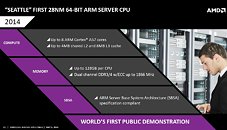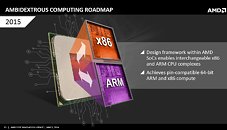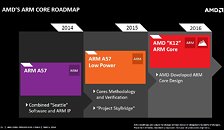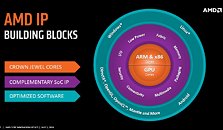Monday, May 5th 2014

AMD Announces Ambidextrous Computing Roadmap
AMD today announced a roadmap of near- and mid-term computing solutions that harness the best characteristics of both the x86 and ARM ecosystems, called "ambidextrous computing." The cornerstone of this roadmap is the announcement of AMD's 64-bit ARM architecture license for the development of custom high-performance cores for high-growth markets. Today's announcement also provides a forward-looking glimpse into AMD's development plans to deliver truly unmatched ambidextrous computing and graphics performance using a shared, flexible infrastructure to enable its customers to blaze new paths of innovation for the embedded, server and client markets as well as semi-custom solutions.
"Before today, AMD was the only company in the world to deliver high performance and low-power x86 with leadership graphics. AMD now takes a bold step forward and has become the only company that can provide high-performance 64-bit ARM and x86 CPU cores paired with world-class graphics," said Rory Read, AMD president and CEO. "Our innovative ambidextrous design capability, combined with our portfolio of IP and expertise with high-performance SoCs, means that AMD is set to deliver ambidextrous solutions that enable our customers to change the world in more efficient and powerful ways."The market for ARM- and x86-based processors is expected to grow to more than $85 billion by 2017(1). AMD is uniquely positioned as the only company delivering differentiated solutions capable of addressing the breadth of this market. This is the first time a major processor provider has created the IP path to allow others to leverage innovation across both ARM and x86 ecosystems.
AMD's ambidextrous computing roadmap includes:
AMD today also publicly demonstrated for the first time its 64-bit ARM-based AMD Opteron A-Series processor, codenamed "Seattle," running a Linux environment derived from the Fedora Project. The Fedora Project is a Red Hat-sponsored, community-driven Linux distribution, providing a familiar, enterprise class operating environment to developers and IT administrators worldwide. This Fedora Project-based Linux environment enables companies to transition to ARM-based servers without the need to integrate entirely new tools and software platforms to their IT environments. This demonstration represents a significant step forward in expanding the footprint of ultra-efficient 64-bit ARM processors within the data center.
"Before today, AMD was the only company in the world to deliver high performance and low-power x86 with leadership graphics. AMD now takes a bold step forward and has become the only company that can provide high-performance 64-bit ARM and x86 CPU cores paired with world-class graphics," said Rory Read, AMD president and CEO. "Our innovative ambidextrous design capability, combined with our portfolio of IP and expertise with high-performance SoCs, means that AMD is set to deliver ambidextrous solutions that enable our customers to change the world in more efficient and powerful ways."The market for ARM- and x86-based processors is expected to grow to more than $85 billion by 2017(1). AMD is uniquely positioned as the only company delivering differentiated solutions capable of addressing the breadth of this market. This is the first time a major processor provider has created the IP path to allow others to leverage innovation across both ARM and x86 ecosystems.
AMD's ambidextrous computing roadmap includes:
- "Project SkyBridge" - This design framework, available starting in 2015, will feature a new family of 20 nanometer APUs and SoCs that are expected to be the world's first pin-compatible ARM and x86 processors. The 64-bit ARM variant of "Project SkyBridge" will be based on the ARM Cortex-A57 core and is AMD's first Heterogeneous System Architecture ("HSA") platform for Android; the x86 variant will feature next-generation "Puma+" CPU cores. The "Project SkyBridge" family will feature full SoC integration, AMD Graphics Core Next technology, HSA, and AMD Secure Technology via a dedicated Platform Security Processor (PSP).
- "K12" - A new high-performance, low-power ARM-based core that takes deep advantage of AMD's ARM architectural license, extensive 64-bit design expertise, and a core development team led by Chief CPU Architect Jim Keller. The first products based on "K12" are planned for introduction in 2016.
AMD today also publicly demonstrated for the first time its 64-bit ARM-based AMD Opteron A-Series processor, codenamed "Seattle," running a Linux environment derived from the Fedora Project. The Fedora Project is a Red Hat-sponsored, community-driven Linux distribution, providing a familiar, enterprise class operating environment to developers and IT administrators worldwide. This Fedora Project-based Linux environment enables companies to transition to ARM-based servers without the need to integrate entirely new tools and software platforms to their IT environments. This demonstration represents a significant step forward in expanding the footprint of ultra-efficient 64-bit ARM processors within the data center.




18 Comments on AMD Announces Ambidextrous Computing Roadmap
Edit: makes sense now why they called the transitional CPU Project Skybridge.
They are branching out with this ambidextrous design for better or worse.
I for one think its a good gamble to swing around Intel and grab low-mid x86 marketshare while moving into 64bit Arm architecture for new markets.
But all this is still too early to tell.
I think you mean this image in the red next to AMD "K12" ARM Core:
Hmmm... mashed potatoes with gravy?
On topic, I'm curious that the mountain means too. You know, maybe it means that it's the first of AMD's own ARM based CPU, because the first few are using the ARM Cortex-A57 cores where the "K10" CPU will be AMD's own custom ARM core, but some clarification on that would be pretty awesome.
Thanks for the clarification by the way. I was unaware the post started with just 3 images. I missed @Jizzler 's post.
Edit: That's because I posted before him and haven't checked the thread since. Thanks nonetheless. :)